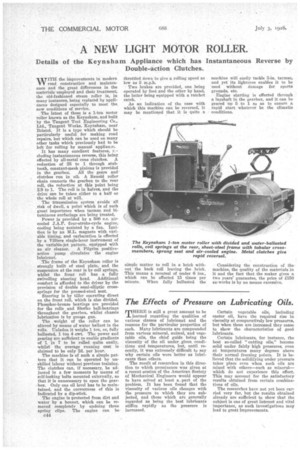A NEW LIGHT MOTOR ROLLER.
Page 66

If you've noticed an error in this article please click here to report it so we can fix it.
Details of the Keynsham Appliance which has Instantaneous Reverse by Double-action Clutches.
WITH the improvements in modern road construction and maintenance and the great differences in the materials employed and their treatment, the old-fashioned steam roller is, in many instances, being replaced by appliances designed especially to meet the new conditions of service.
The latest of these is a 1-ton motor roller known as the Keynsham. and built by the Tangent Tool Engineering Co.,• Ltd., Tangent Works, Keynsham, near. Bristol. It is a type which should be particularly useful for making road repairs, but which can be used on many other tasks which previously had to be left for rolling by manual applianze.
It has many excellent features, 31 chiding instantaneous reverse, this being effected by all-metal cone clutches. A reduction of 25 to 1 through stabtooth, constant-mesh pinions is provided in the gearbox. All the gears and clutches run in oil h A Renold roller chain connects the gearbox to the rear roll, the reduction at this point being 2.0 to 1. The roll is in halves, and the drive can be taken either to a half or the whole roil at will.
The transmission system avoids all risk of dwell, a point which is of such great importance when tarmac and bituminous surfacings are being treated, Power is provided by a 500 c.c. aircooled J.A.P. four-stroke-cycle engine, cooling being assisted by a fan. Ignition is by an M.L. magneto with variable timing, and carburation is effected by a Villiers single-lever instrument of the variable-jet pattern, equipped with
an air cleaner. A Pilgrim positiveaction pump circulates the engine lubricant.
The frame of the Keynshain roller is strongly built of steel plate, and the suspension at the rear is by coil springs, whilst the front roll has a fully swivelling steering head. Additional comfort is afforded to the driver by the provision of double semi-elliptic crosssprings for the pressed-steel seat Steering is by tiller operating direct on the front roll, which is also divided. Phosphor-bronze bearings are provided for the rolls and Skefko ball-bearings throughout the gearbox, whilst chassis lubrication is by greaee gun.
The weight of the roller can be altered by means of water ballast in the rolls. Unladen it weighs 1 ton, or, fully ballasted, 1 ton 4 cwt. The power and gearing are sufficient to enable gradients of I in 7 to be rolled quite easily, whilst the average running cost is claimed to be only 2d. per hour.
The machine is of such a simple pattern that it can be operated by unskilled labour without previous training. The clutches can, if necessary, be adjusted in a few moments by means of self-locking bolts mounted externally, so that it is unnecessary to open the gear-box. Only one oil level has to be maintained, and the correctness of this is indicated by a dip-stick.
The engine is protected from dirt and water by a bonnet, which can be removed completely by undoing three spring clips. The engine can be
014
throttled down to give a rolling speed as low as 5 m.p.h.
Two brakes are provided, one being operated by foot and the other by hand, the latter being equipped with a ratchet catch. • As an indication of the ease with which this machine can be reversed, it may be mentioned that it is quite a simple matter to roll in a brick without the back roll leaving the brick. This means a reversal of under 6 ins., which can be effected 15 times per minute. When fully ballasted the machine will easily tackle 3-in, tarmac, and yet its lightness enables it to be used without damage for sports grounds, etc.
Engine starting is effected through a layshaft in the gearbox, and it cart be geared up 5 to 1 so as to ensure a rapid start whatever be the climatic conditions.
Considering the construction of the machine, the quality of the materials in it and the fact that the maker gives a two years' guarantee, the price of £150 ex-works is by no means excessive.












































































































